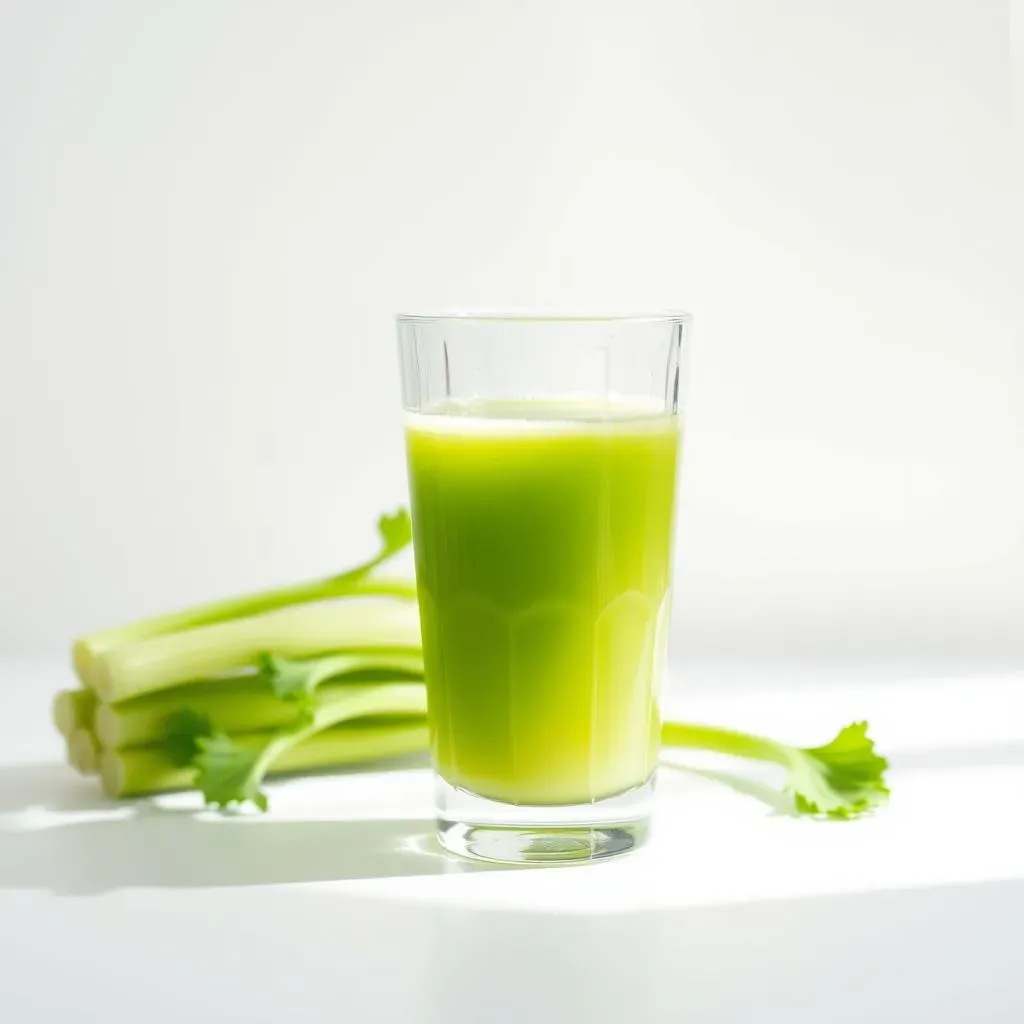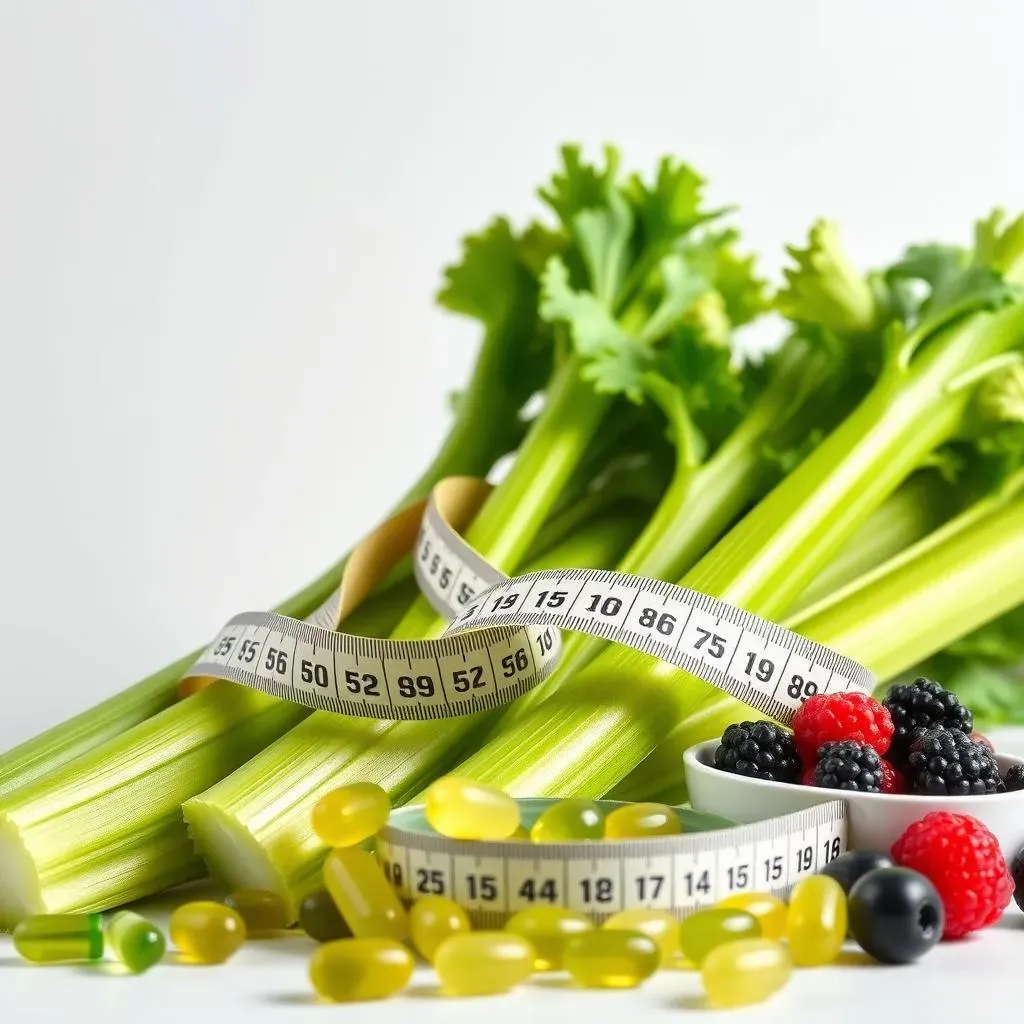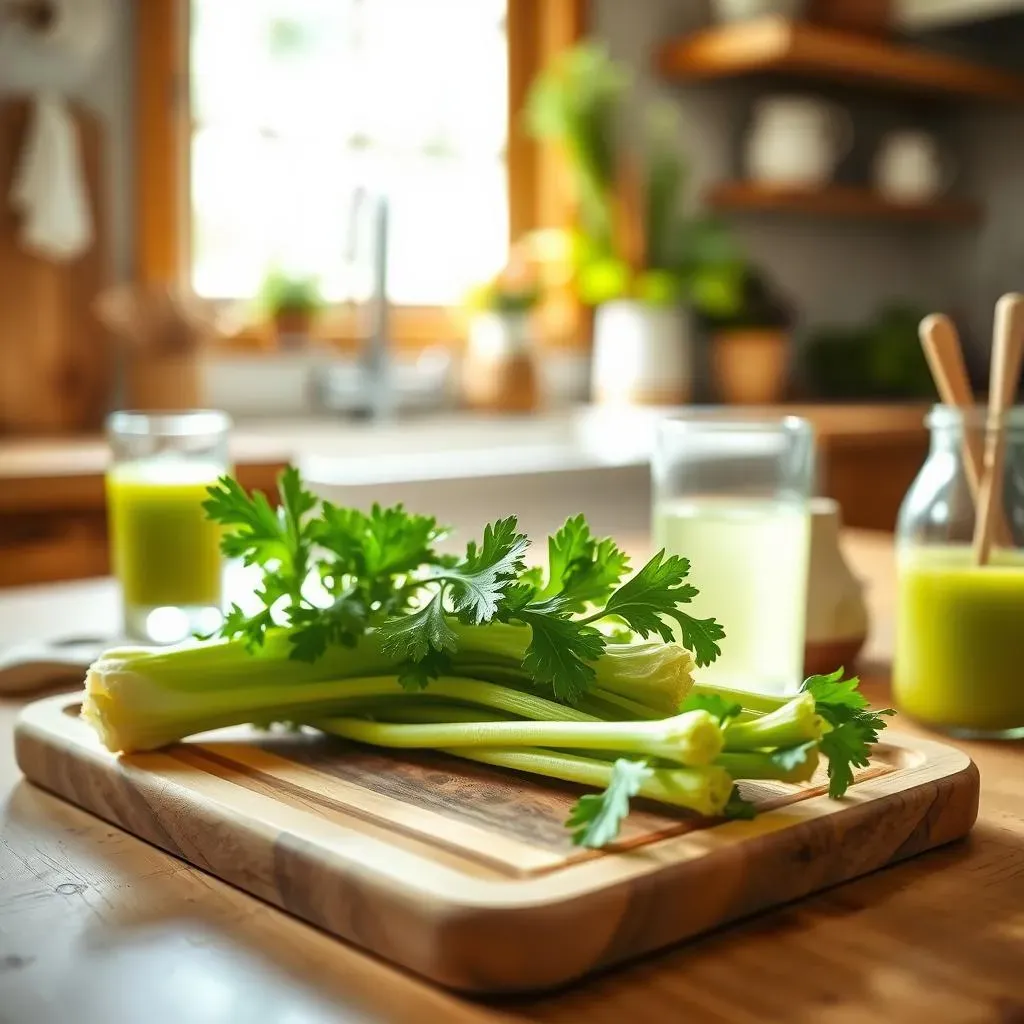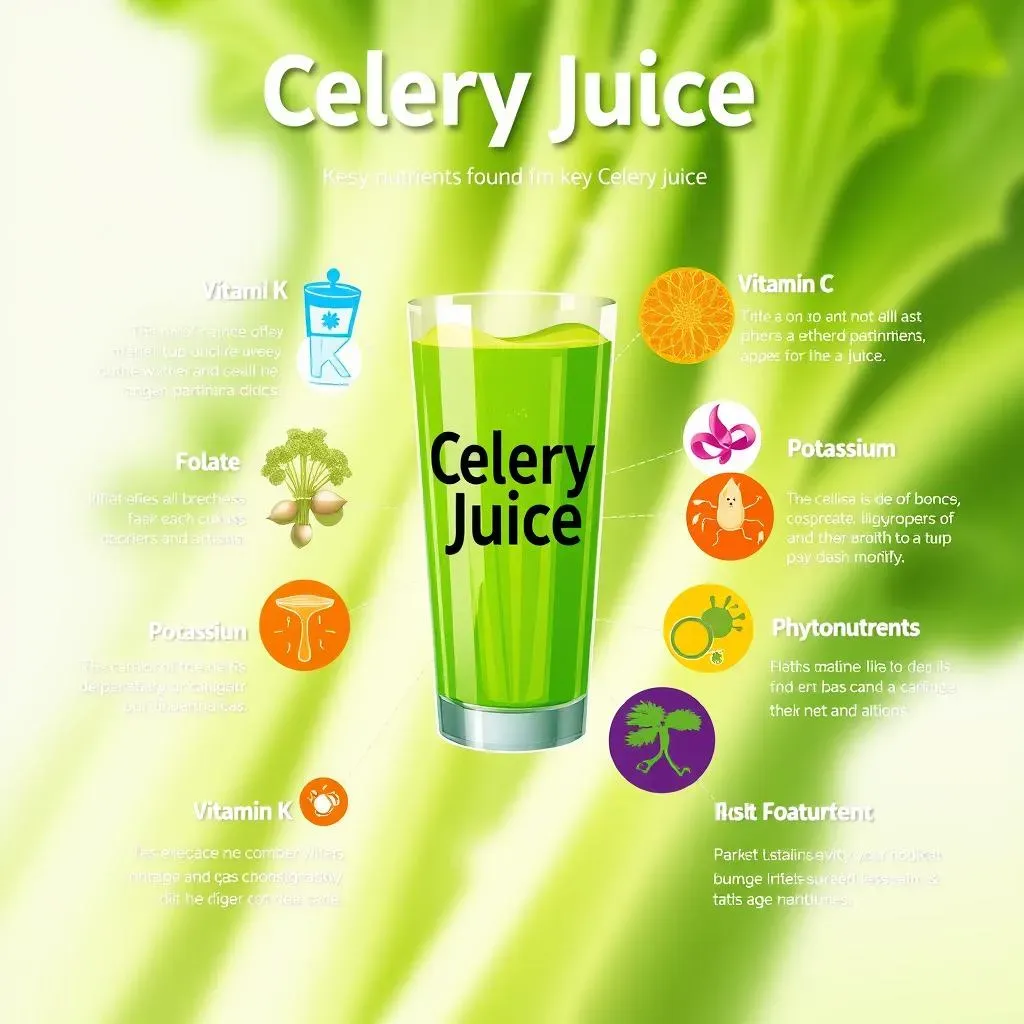Table of Contents
You've probably seen the green juice flooding your social media feed, the one everyone claims is the secret to perfect health: celery juice. People are talking about "detoxing with celery juice," but is it the magic potion it's made out to be, or just another health trend? We're going to cut through the noise and get to the bottom of this. Forget the fancy claims and celebrity endorsements; we're looking at the real deal. This isn't about jumping on the bandwagon, it's about understanding if a celery juice cleanse is beneficial or potentially harmful. We'll explore what a "cleanse" even means, if celery juice is a safe option, and what benefits, if any, you can actually expect. We'll also look at the real nutritional value of celery, and how to prepare your juice the right way. So, ready to find out if this green drink lives up to the hype? Let's get started.
What's the Deal with Celery Juice Cleanses?

What's the Deal with Celery Juice Cleanses?
The Hype Machine
Okay, so celery juice cleanses are everywhere right now. It's like one day nobody cared about celery, and the next, it’s the health guru's best friend. The basic idea is pretty simple: you drink a whole lot of fresh celery juice, usually on an empty stomach, and supposedly, amazing things happen. People claim it can do everything from clear up your skin to fix digestive issues and give you boundless energy. It's got this reputation as a magical detoxifier, flushing out all the bad stuff. But, is it really that simple? That's what I'm trying to find out, because I'm a little skeptical myself.
Behind the Green Curtain
The thing is, our bodies already have built-in detox systems—your liver and kidneys are working hard every single day to keep you clean. When people talk about "toxins," it's often a bit vague, and it's not clear that celery juice is actually the superhero they make it out to be. A lot of the claims are based on anecdotal evidence, which is basically just personal stories, not scientific proof. It's like saying, "I felt great after drinking this, so it must work for everyone!" I'm not saying these stories are false, but we need to dig deeper. We're looking for actual studies, not just wishful thinking.
Claim | Reality |
|---|---|
Celery juice is a magical detoxifier. | Our bodies naturally detoxify; no extra juice needed. |
It cures all sorts of ailments. | Claims based on anecdotal stories, not scientific facts. |
It's a quick fix for health problems. | Health is a long game, not a quick fix. |
Is a Celery Juice Detox Actually Safe?

Is a Celery Juice Detox Actually Safe?
The Oxalate Question
Alright, let's talk about the not-so-glamorous side of celery juice. It turns out, celery is pretty high in something called oxalates. Now, these aren't usually a big deal if you're eating a normal, balanced diet, but when you're downing huge amounts of celery juice, it can become a problem. Oxalates can bind to minerals in your body and form crystals. If you're prone to kidney stones, this is a red flag. These crystals could make things worse. It's not something to take lightly.
Potential Digestive Issues
Another thing to consider is that your gut might not be thrilled with all that celery juice. When you suddenly introduce a large amount of any new food, especially on an empty stomach, you can experience some not-so-fun side effects. Think bloating, gas, and even diarrhea. It's like your digestive system is throwing a mini-tantrum. Not everyone will experience this, but it's a possibility to be aware of. It's also worth noting that if you have any pre-existing digestive issues, like IBS, celery juice might make them worse, not better.
Potential Risk | Explanation |
|---|---|
High Oxalate Content | Can contribute to kidney stones, especially in susceptible individuals. |
Digestive Discomfort | May cause bloating, gas, and diarrhea due to the sudden increase in fiber and fluid. |
Medication Interactions | Can interfere with certain medications, such as blood thinners. |
The "Detox" Myth
Finally, let’s address the “detox” claim itself. The idea of a quick fix to eliminate “toxins” is tempting, but it's not how your body works. Your liver and kidneys are the real detox superheroes, and they do a fantastic job of cleaning up without the need for a trendy juice. In fact, a very restrictive diet like a juice cleanse can actually stress your body, and might even lead to nutrient deficiencies in the long run. So, while celery juice might have some benefits, it’s important to approach it with a healthy dose of skepticism, especially if you're thinking about it as a way to "detox." It's not a magic bullet.
The Real Benefits of Celery (Beyond the Juice)

The Real Benefits of Celery (Beyond the Juice)
Celery: The Unsung Hero
Okay, so maybe the juice isn't a miracle cure, but let's not throw the celery out with the bathwater! This veggie actually has some pretty cool stuff going on. When you eat celery, you're getting a good dose of fiber, which is fantastic for your digestion. It helps keep things moving smoothly and can even help you feel full for longer, which is great if you're watching your weight. Plus, celery is packed with vitamins and minerals, like vitamin K, which is important for healthy blood clotting and strong bones. So, while the juice might be a bit overhyped, celery itself is a solid nutritional choice.
More Than Just Crunch
Beyond the basics, celery also contains some pretty interesting compounds. Researchers are looking into its potential anti-inflammatory and antioxidant properties. Inflammation is linked to all sorts of nasty health issues, so anything that might help with that is a good thing. Antioxidants, on the other hand, help protect your cells from damage. I'm not saying celery is going to turn you into a superhero, but it’s definitely doing more for you than just adding a satisfying crunch to your salad. It's a great example of how whole foods can offer benefits that a juice just can’t replicate. Eating the whole thing gives you the fiber, and it's not just the juice that is beneficial.
Benefit | Why It Matters |
|---|---|
Fiber | Aids digestion, promotes fullness, and helps regulate blood sugar. |
Vitamin K | Essential for blood clotting and bone health. |
Antioxidants | Helps protect cells from damage. |
Anti-inflammatory compounds | May reduce inflammation in the body. |
Juicing 101: How to Make Celery Juice the Right Way

Juicing 101: How to Make Celery Juice the Right Way
The Basics: Celery Prep
Alright, so you're thinking about giving celery juice a try? First things first, let's talk about how to actually make the stuff. It's not as simple as just throwing a stalk of celery into a blender. You wanna start with fresh, organic celery if you can. Give it a really good wash, because you're going to be using the whole thing. Chop off the very bottom, where the roots were, and then cut the stalks into smaller pieces. This will make it easier for your juicer or blender to handle it. Don't worry about peeling it or anything; just wash, chop, and you're good to go.
Juicer vs. Blender: The Showdown
Now, for the big question: do you need a fancy juicer or can you get away with a blender? If you have a juicer, that's great, it will give you a smoother juice with less pulp. Just feed the celery pieces through and you're set. If you don't have a juicer, don't worry, a blender works just fine. Add a little water to help things move, and blend it up until it’s smooth. Then you need to strain it, using a nut milk bag or a fine-mesh sieve to remove the pulp. It's an extra step, but it's worth it for that smooth, drinkable juice. Either way, try to drink it as soon as you make it for the best flavor and nutrition.
Method | Pros | Cons |
|---|---|---|
Juicer | Smoother juice, less pulp | Requires a juicer |
Blender | More affordable, no extra equipment | Requires straining, pulp |
Tips for the Best Juice
No matter what method you choose, there are a few things you can do to make your celery juice taste better. First, use cold celery. If your celery is already chilled, it will make the juice taste fresher. Second, if you find the taste a bit too strong, you can add a little bit of lemon or ginger. Just a small amount can make a big difference. But keep in mind that adding other ingredients will change the juice and its potential benefits. Finally, try to drink your juice on an empty stomach, ideally first thing in the morning. This is what most people recommend, but you can always adjust it to what works best for you.
Don't Forget the Cleanup
Okay, so you've made your juice, you're feeling healthy and energized. Now, don't forget about the cleanup! This is the not-so-fun part of making any kind of juice. If you used a juicer, make sure you clean it right away, or else the pulp will get stuck and it will be a pain to clean later. If you used a blender, rinse it well after straining. I know cleaning is not the most exciting part, but it's important to make sure your equipment stays in good shape. This way, you can keep making your celery juice without any extra hassle.
Celery Juice: What's Inside? (Nutrition Facts)

Celery Juice: What's Inside? (Nutrition Facts)
The Core Nutrients
Okay, so we've talked about the hype and the risks, but what's actually in celery juice? Let's break it down. First off, it's mostly water, which is great for hydration. But beyond that, it's got some vitamins and minerals, though not in huge amounts. You'll find things like vitamin K, which is important for blood clotting, and some vitamin C, an antioxidant that supports your immune system. There are also some minerals like potassium, which helps with fluid balance and nerve function, and folate, which is important for cell growth. It's not a nutritional powerhouse compared to, say, a kale smoothie, but it's not completely empty either.
However, it's crucial to understand that juicing removes most of the fiber. Fiber is a big deal for your digestion and overall health. When you juice, you're essentially just getting the water and some of the micronutrients, but you're missing out on the bulk and the benefits that fiber provides. So, while there are some good things in celery juice, it's not the same as eating the whole vegetable.
Micronutrients and More
Let's look closer at the micronutrients. Celery juice contains small amounts of vitamins A, B6, and some other B vitamins. It also has some calcium, magnesium, and manganese. These are all important for various functions in your body, from energy production to bone health. But here's the catch: the amounts are relatively small. You'd likely get more of these nutrients from eating a balanced diet with a variety of fruits, vegetables, and whole foods. The idea that celery juice is a super-concentrated source of these nutrients is a bit exaggerated.
It also contains some phytonutrients, which are plant compounds that have potential health benefits, like antioxidants and anti-inflammatory effects. However, the research on these compounds in celery is still ongoing, and we don't know exactly how they work or how much benefit they provide. So, while these phytonutrients sound promising, more research is needed before we can make any strong conclusions. It also has some natural electrolytes, which can help with hydration.
Nutrient | Benefit |
|---|---|
Vitamin K | Blood clotting, bone health |
Vitamin C | Antioxidant, immune support |
Potassium | Fluid balance, nerve function |
Folate | Cell growth and function |
Phytonutrients | Antioxidant and anti-inflammatory effects |
Electrolytes | Hydration |
The Big Picture
So, what does all this mean? Celery juice does contain some valuable nutrients, but it's not a nutritional powerhouse. It's primarily water, with some vitamins, minerals, and phytonutrients. The key thing to remember is that it lacks the fiber you'd get from eating whole celery. If you're looking for a quick way to hydrate, or if you enjoy the taste, it's not necessarily bad for you. But don't expect it to be a magic bullet for your health. A balanced diet with a variety of fruits, vegetables, and whole foods is still the best way to get the nutrients you need. Don’t rely on celery juice as the main source of your daily nutrients.
The Bottom Line on Celery Juice and Detox

The Bottom Line on Celery Juice and Detox
The Final Verdict
Okay, so we've gone through the hype, the risks, the real benefits, and the how-to of celery juice. What's the final word? Is it the detox miracle everyone's been talking about? Honestly, no. The idea of a "detox" itself is pretty misleading. Your body's already doing a great job of cleaning house. Celery juice isn't going to magically flush out toxins that your liver and kidneys aren't already handling. Now, that doesn't mean celery juice is bad for you, but it's also not a cure-all. It's mostly water, some vitamins, some minerals, and some phytonutrients. It might be a nice way to hydrate, and it could potentially have some anti-inflammatory and antioxidant benefits, but it's not the magic bullet for weight loss or perfect health that some people claim it is.
A Balanced Approach
The real secret to good health isn't some trendy juice; it's a balanced diet with a variety of whole foods. Think fruits, vegetables, lean proteins, and whole grains. These foods provide the fiber, vitamins, minerals, and other nutrients your body needs to thrive. Celery, in its whole form, is a great addition to that balanced diet. But relying on celery juice as a quick fix or a detox tool is not a sustainable or scientifically backed approach. If you enjoy celery juice, that's fine, but don't expect it to be a substitute for a healthy lifestyle. It's okay to enjoy it in moderation, but it's not the answer to all your health problems.
Key Takeaway | What It Means |
|---|---|
"Detox" claims are often misleading | Your body naturally detoxifies; no special juice needed. |
Celery juice is not a miracle cure | It has some benefits, but it's not a substitute for a balanced diet. |
Whole foods are key | Focus on a variety of fruits, vegetables, and whole grains. |
Moderation is important | Enjoy celery juice if you like, but don't overdo it. |
What to Do Next
So, what should you do with this information? If you're curious about celery juice, give it a try, but go into it with realistic expectations. Don't expect it to solve all your health problems or give you a quick fix for weight loss. If you have any existing health conditions or concerns, it's always a good idea to talk to a doctor or registered dietitian before making any major changes to your diet. They can help you understand what's best for your individual needs. I think the real lesson here is to be skeptical of health trends and to prioritize a balanced approach to nutrition. It's about making sustainable, healthy choices, not chasing the next big thing.
My Final Thoughts
I'm glad we had this chat about celery juice. It's so easy to get caught up in the hype, but I hope this has given you a clearer picture. Remember, there are no quick fixes or magic bullets when it comes to health. It's about making informed choices and focusing on a balanced, sustainable approach. If you enjoy celery juice as part of that, that's great, but don't rely on it to be the answer to all your health questions. Let's keep exploring the world of nutrition, but always with a healthy dose of skepticism. Cheers to making informed decisions and taking care of ourselves!